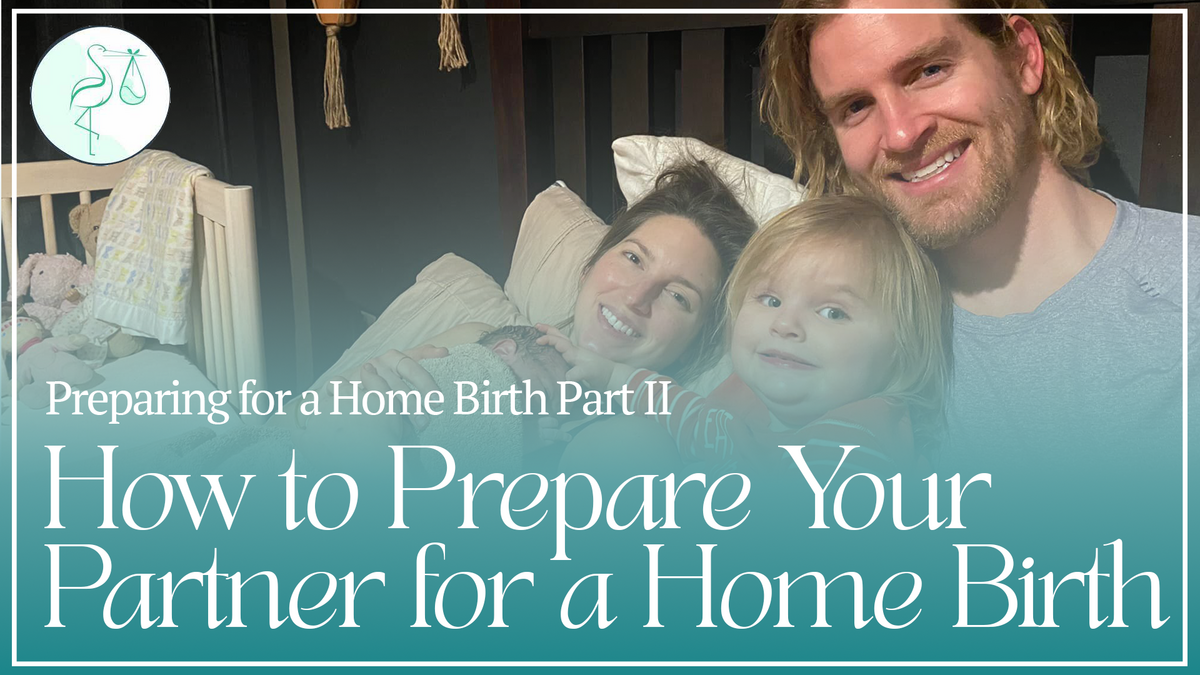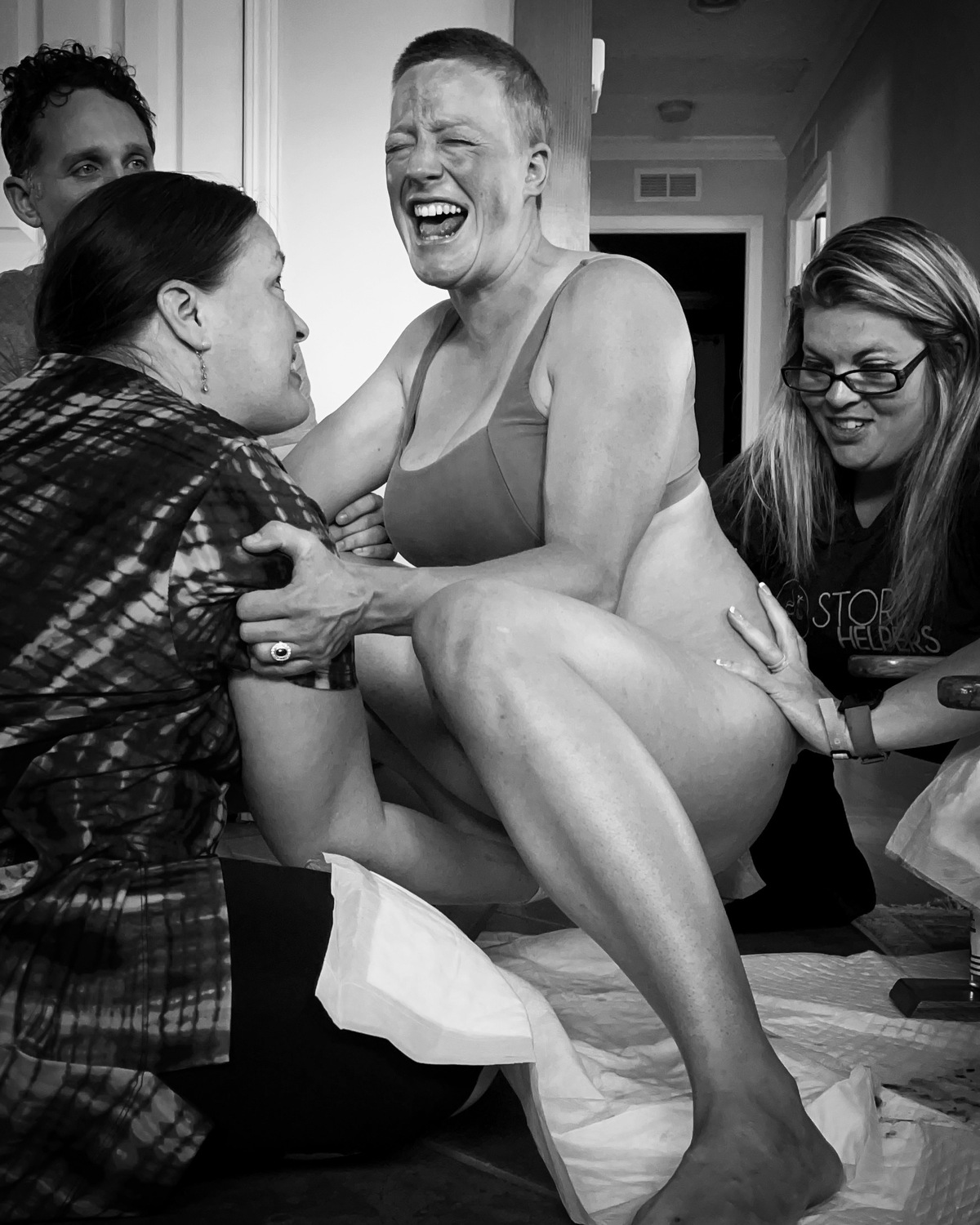Preparing for A Home Birth Part II: How to Prepare Your Partner for a Home Birth
Preparing for A Home Birth Part II: How to Prepare Your Partner for a Home Birth

Preparing for a homebirth is an exciting yet intensive process that many soon-to-be parents go through during pregnancy. Mamas and their partner both have important preparations to make before the day of the birth. Learning what is expected of both of you and how to work with your midwife and doula will make the day of birth much easier.
This is the second part of your guide for preparing for a home birth (the first part is linked here). In this portion of the guide, we will discuss the partner's side of the home birth journey, including what Mama and her partner need to prepare, how a partner should contribute on the day of the birth, and what both of you need to know leading up to the birth.
Keep reading to learn more! We will tell you about the stages of birth, and how Mama's partner can be a source of support through open communication and attending birth classes.

Knowing What to Expect: Stages of Birth
Knowing what to expect during the stages of birth is essential for partners preparing for a home birth. By understanding the process, partners can better support the birthing mama and alleviate any fears or anxieties they may have.
As a partner, your goal is to support Mama as she gives birth and assist the midwife and doula in whatever they ask of you. Homebirths can be emotional, but you need to prepare yourself and keep a cool head to ensure that you are there for Mama and that the midwife and doula have everything they need to do their job to help.
Let's take a look at the three stages of birth and what to prepare and expect for each.
Stage 1 - Early Labor
During the first stage of birth, known as early labor, the cervix begins to dilate, and contractions start becoming more regular and intense. Partners need to be aware of the signs of early labor in mamas and understand what to expect during this stage.
One of the key signs of early labor is the onset of regular contractions. These contractions may feel like menstrual cramps or a dull ache in the lower back and abdomen. As labor progresses, the contractions will gradually become longer, stronger, and closer together.
Partners can support their birthing mama by not overwhelming or influencing them to make decisions during this time. Try and set yourself up as a calming force who is there to provide support and guidance during this time. Listen to Mama and try to understand her needs.
Remember, early labor can last anywhere from a few hours to several days, particularly for first-time mothers. Partners need to remain patient and supportive during this stage. Encouraging rest, providing comforting measures like back massages and offering nourishing snacks can all help the mama stay relaxed and comfortable.
As early labor progresses, it is essential to stay in close contact with the healthcare provider, midwife, and doula, updating them on the progress and any changes in birth patterns. They will advise when it is appropriate to head to the birth location or when to contact them for further guidance.
Stage 2 - Active Labor
The transition from early labor to active labor marks the beginning of the more intense and accelerated phase of childbirth. During this stage, the cervix continues to dilate, and contractions become stronger, longer, and closer together. Partners need to be prepared to support the mama through this intense stage.
As active labor progresses, the intensity of contractions increases. Partners play a crucial role in helping the mama cope with discomfort. Offer words of reassurance and remind Mama that she is powerful and capable of hard things.
In active labor, it is important to create a calm and supportive birthing environment. Dimming the lights, playing soothing music, and providing options for comfort measures such as a birth ball or warm water can contribute to a positive birth experience. Keeping Mama hydrated and nourished with small, easily digestible snacks can help maintain her energy levels.
Throughout active labor, partners should remain attentive to the Mama's needs, offering continuous emotional support and reassurance. It is important to remember that every birthing experience is unique, and maintaining open communication with the healthcare provider or midwife and doula allows for any necessary adjustments to the birth plan.
Stage 3 - Transition and Birth
As the mama enters the final stage of birth, known as the transition phase, partners must be prepared for the upcoming delivery. This stage is characterized by the strong urge to push, as the baby descends further down the birth canal.
During this time, the partner should continue to encourage and support Mama and praise her efforts. Tell her that she is doing an amazing job and offer physical support by finding comfortable positions and holding her hand. Have a pillow close by, in case Mama needs extra support.
Once the birthing person starts pushing, partners can play an active role in helping them through the delivery process. Here are two things you need to keep in mind during this last stage of birth.
- Follow the Midwife or Doula's Guidance: Listen to the instructions provided by the midwife, doula, or healthcare provider. They will guide you on when and how to support Mama during each contraction.
- Offer Counterpressure: Apply counterpressure to the mother's perineum to support the tissues and prevent tearing. This can be done using warm compresses or a hot water bottle wrapped in a clean towel. Again, remember that this is a stressful time for Mama, so only follow this step if the midwife or doula tells you to. Also, it is essential to let your midwife offer support, both physical and emotional.
What is the importance of a strong support network during pregnancy and childbirth? Click here to learn more!

Being a Source of Emotional Support
Emotional support is one of the most valuable contributions partners can make during a home birth. As a mama goes through the intensity of birth, your presence and support can help create a safe and reassuring environment. Below are some tips on how to prepare yourself to be a source of emotional support.
Open Communication
Open communication is essential when preparing for a home birth with your partner. By fostering an environment of trust and openness, you can ensure that both of you are on the same page and have a clear understanding of each other's expectations and concerns.
Start by listening. Encourage your partner to share their fears and anxieties about the home birth experience. By actively listening and validating their feelings, you can provide the emotional support they need. Let them know that their concerns are valid and that you are there to support them every step of the way.
Be open and honest about your feelings and expectations as well. Share any concerns or questions you may have and work together to find solutions. By addressing any potential areas of uncertainty or unease, you can strengthen your bond and increase your confidence as a team.
Regularly check in with each other throughout the pregnancy and birth preparation process. Discuss any new thoughts or concerns that may arise and make sure to adjust your plans accordingly. By maintaining open lines of communication, you can ensure that you both feel heard, supported, and prepared for the upcoming home birth.
Attending Birth Classes
Attending birth classes as a couple is highly beneficial in preparing for a home birth. These classes provide valuable knowledge and skills that can help both partners feel more confident and prepared for the birthing process.
One of the main advantages of attending these classes is learning relaxation techniques and coping strategies. Birthing classes often teach various relaxation techniques, such as deep breathing exercises, visualization, and massage techniques. These techniques can help your partner manage pain and stay calm during birth. Moreover, they can also help you as the birth partner to actively participate and support your partner throughout the process.
By attending birth classes together, you both can learn about the stages of birth, the birthing process, and different comfort management options. This knowledge helps build confidence and trust in the process, allowing you to approach the homebirth experience with a sense of readiness and empowerment.
In addition to learning practical techniques, birthing classes also offer opportunities to connect with other expectant couples going through a similar experience. Sharing experiences, concerns, and advice with peers can create a sense of community and support, offering reassurance during the journey.
What are the benefits of childbirth classes? Learn more in this blog!
Support For Your Home Birth with Stork Helpers
Having a loving partner on the sidelines, standing by to support Mama and the midwife and doula in any way they can is one of the most important aspects of a home birth. However, sometimes support from a single person, especially one who has not participated in a home birth before, is just not enough.
Mama will be going through an intense and challenging process during birth. Extra support to ensure that Mama is heard and cared for even during the most intense portions of birth is necessary. That is where a doula comes in.
Doulas are there to support you and ensure that your needs are met even during the most stressful times of your home birth. Tamara and Skylar of Stork Helpers have helped dozens of mamas, and their partners get the support they need during pregnancy and birth. We are here for you.
Click here to start a conversation with Stork Helpers about your pregnancy and birth needs today!
For more pregnancy tips and support, follow Stork Helpers on Facebook, Instagram, and LinkedIn!
Happy with the difference Stork Helpers made in your birth journey? Leave us a quick five-star review here!

